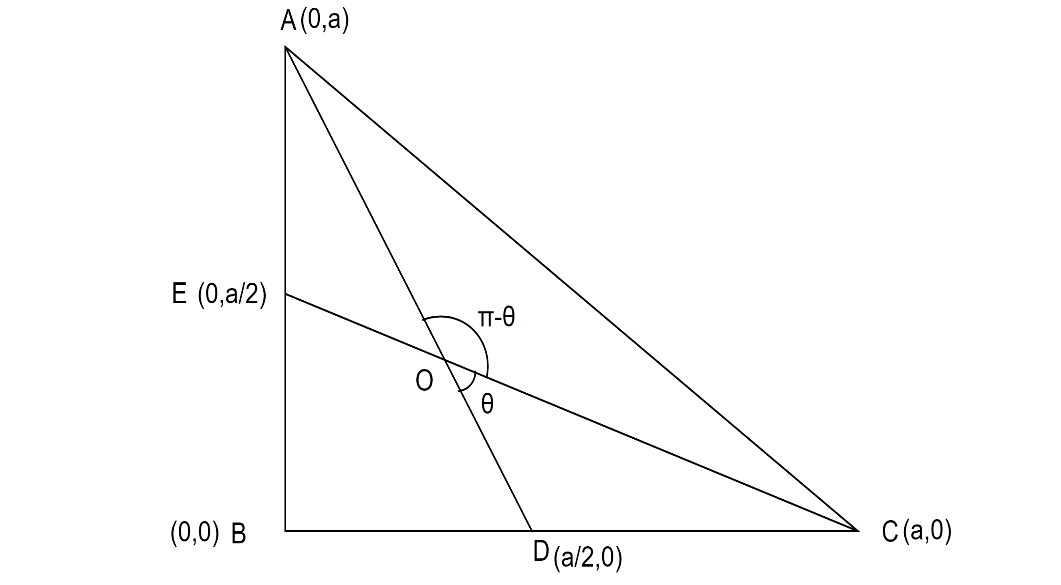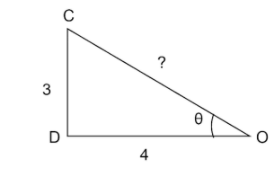Question
Question: The cosine of the obtuse angle formed by medians drawn from the vertices of the acute angles of an i...
The cosine of the obtuse angle formed by medians drawn from the vertices of the acute angles of an isosceles right angled triangle is,
(A)5−1 (B)5−2 (C)5−3 (D)5−4
Solution
The first step is to find the slope of the two medians. By using the angle between the two lines formula, we can find the tangent angle. In question they have asked the cosine of the obtuse angle, so we have to calculate accordingly by using tan theta.
Formula used
The Pythagoras theorem is used in this question which states that the square of the length of hypotenuse is equal to the sum of the square of the other two sides.
The slope of the line is,
m1 = x2−x1y2−y1
The angle between two lines of the triangle is,
tanθ=1 + m1m2m1−m2
Where,
x1,x2 be the axis of the x formed by the line segment
y1,y2 be the axis of the y formed by the line segment
m1,m2 be the gradient of the two lines
Complete step-by-step answer:
The data given in the question is,
The isosceles right-angled triangle △ABC is drawn below,
Let a be the length of the two sides of the isosceles right-angled triangle

AD and CE are the medians drawn from the vertices which intersect at the point O
θ be the angle made by the medians which forms the triangle △DOC
π−θ be the angle made by the medians which forms the triangle △AOC
To find the cosine of the obtuse angle,
Step 1
The slope of the median CE in the above triangle be ,
m1 = x2−x1y2−y1
While substituting the values of x and y axes in the above we get,
m1 = 0−a2a−0
While solving we get the slope of the median CE,
m1 = 2−1
The slope of the median AD in the above triangle be ,
m2 = x2−x1y2−y1
While substituting the values of x and y axes in the above we get,
m2 = 2a−00−a
While solving we get the slope of the median AD,
m2 = −2
Step 2
The angle between the two lines of the triangle is,
tanθ=1 + m1m2m1−m2
While substituting the gradient values in the above we get,
tanθ=1 + (2−1)(−2)2−1−(−2)
While solving the above we get,
tanθ=223
The tangent angle between two medians is,
tanθ=43=43
Step 3
By the question, we have to find the cosine of the obtuse angle,

The above triangle is drawn by using tanθ=43 since tanθ=adjacent sideopposite side
By using the pythagoras theorem we will be able to find the third side of the above triangle,
OC2=OD2 + DC2
By substituting the values, we get,
OC2=42 + 32
While solving the above we get,
OC2=16 + 9
By adding we get.
OC2=25
By solving we get,
OC=25
The third side(hypotenuse) of the above triangle will be,
OC=5
Then the cosine of the triangle will be,
cosθ=hypotenuseadjacent side
By substituting the values, we get,
cosθ=54
But the angle formed by the cosine of the obtuse angle will be π−θ
cos(π−θ)=−cosθ
By substituting the cos theta value, we get,
cos(π−θ)=−54
∴The required cosine angle of the obtuse angle is −54.
Hence, the cosine of the obtuse angle formed by medians drawn from the vertices of the acute angles of an isosceles right angled triangle is −54 .
Thus, the option (D) is correct.
Note: The angle of any straight line will be 180∘or π. Since the medians drawn are straight lines, it forms an angle of 180∘or π . That is the reason, we subtract π and θ in the first triangle . The two medians intersect to form the centroid of the triangle.
